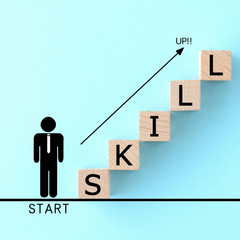
Feeling stuck at a career crossroads, unsure whether to turn left towards copywriting or right towards copy editing?
You’re not alone!
Many people find themselves grappling with the choice between these two closely related, yet distinctly different professions.
This guide is here to clear up the confusion and help you decide which path aligns best with your skills and career aspirations.
Whether you're a wordsmith eager to craft persuasive content that moves readers, or a detail-oriented individual passionate about perfecting texts into masterpieces, understanding the nuances of copy editing vs copywriting is crucial.
By the end of this guide, you'll not only know the roles inside and out but will feel confident as a lion in choosing the right career for you.
What is Copyediting?

Copy editing often flies under the radar, yet it's an essential cog in the publishing machine.
At its core, copy editing is about refining and perfecting a piece of writing. This process ensures that the final product is free of errors, consistent in style, and clear to its readers.
Imagine this:
A copy editor is like a tailor for text. They trim the excess, patch the holes in logic, and smooth out the style to make sure everything fits just right before it's presented to the public. This role requires a meticulous eye for detail and a firm grasp of grammar and style guidelines.
Whether it’s a blog post, a novel, or a marketing brochure, the copy editor steps in after the initial drafts are complete. They comb through each line to correct spelling, grammar, punctuation, and syntax errors. But their job doesn’t stop at simple corrections; they also enhance readability, ensure tone consistency, and verify factual accuracy.
Copy editors are the unsung heroes who polish written materials to shine their brightest, ensuring that the message is not only delivered but resonates clearly and professionally with its audience.
If precision and perfection in written content spark your interest, copy editing might just be your calling.
What is Copywriting?

Copywriting is the art and science of crafting persuasive messages that aim to prompt action, whether it's buying a product, signing up for a newsletter, or simply engaging with content.
A copywriter's job is to use words to not only convey information but also to evoke emotion and drive decision-making.
Consider a copywriter as a skilled chef in a bustling kitchen, where the main ingredients are words, creativity, and strategic thinking. They mix these elements to create appealing content that attracts and retains an audience’s attention.
Whether it’s a catchy headline, a compelling email sequence, or an informative blog post, each piece is designed to achieve specific business objectives.
Copywriting involves a deep understanding of human psychology and market trends, allowing copywriters to connect with diverse audiences on a level that goes beyond mere words. They must be adept at telling stories that resonate, crafting narratives that align with brand voices, and tweaking their tone to suit different platforms and purposes.
If you find yourself drawn to creative problem-solving and you have a knack for influencing others through your writing, copywriting might just be the perfect fit for your career.
It's a role where each project brings a new challenge and an opportunity to make a measurable impact in the world of marketing and advertising.
Copyediting vs Copywriting: What are The Main Differences?

Understanding the main differences between copy editing and copywriting is essential for anyone looking to make a career decision. Though they both play crucial roles in the content creation process, their responsibilities, objectives, and skills do not completely overlap.
1. Purpose and Focus
The primary aim of copywriting is to create original content that persuades or informs an audience, driving them towards a specific action. In contrast, copy editing focuses on refining and polishing existing content to ensure accuracy, clarity, and consistency. Copywriters generate the blueprint; copy editors refine it.
2. Creative vs. Corrective
Copywriting is inherently creative. It involves coming up with ideas, developing messages, and writing content that engages and motivates readers. Copy editing, on the other hand, is more corrective. It requires a keen eye for detail to spot errors and inconsistencies and make necessary adjustments to enhance the text's quality and effectiveness.
3. Skill Sets
Both roles require a strong command of language, but their skills diverge beyond this. Copywriters must be creative thinkers with the ability to sell through words, understanding marketing and often SEO (Search Engine Optimization). Copy editors need to be meticulous and detail-oriented, with a deep knowledge of grammar, punctuation, and style guides.
4. End Goals
The end goal of a copywriter is to deliver a compelling message that performs well in terms of engagement and conversion rates. For a copy editor, the goal is to deliver a clean, clear, and error-free document that upholds the publication’s or brand’s standards.
5. Interaction with the Content Lifecycle
Copywriters often engage early in the content creation process, brainstorming ideas and shaping the initial draft. They are integral in setting the direction and tone of the content. Copy editors typically come in during the later stages, after the primary content has been established, to fine-tune and ensure it meets quality standards before publication.
In essence, copywriting is about creation and innovation, while copy editing is about correction and perfection. Knowing which of these aligns more closely with your natural talents and career goals can help you decide the right path for you in the world of words.
Can a Copywriter Also Be a Copy Editor?

In the versatile world of copywriting and copy editing, it's not uncommon to find professionals wearing multiple hats. So, can a copywriter also be a copy editor? Absolutely! However, excelling at both requires a unique set of skills and a flexible approach to content.
Firstly, transitioning between copywriting and copy editing demands a mental shift. As a copywriter, you're the architect, creatively constructing messages from the ground up. As a copy editor, you switch to an analytical mode, scrutinizing text for errors and ensuring the structure is sound.
Here's why some professionals thrive in both roles:
- Comprehensive Skill Set: Being proficient in both copywriting and copy editing can make you extremely valuable, especially in smaller teams or organizations where budget constraints require individuals to fulfill multiple roles. It ensures continuity and consistency across all stages of content production.
- Enhanced Content Quality: A copywriter who can also edit their work brings an additional layer of polish to their projects. This dual capability allows for more streamlined revisions and can significantly shorten the editing process, as they are more likely to catch and fix errors in the initial writing phase.
- Greater Employment Flexibility: With skills in both areas, professionals can offer a broader range of services, making them more attractive to potential employers and clients who seek versatility in their teams.
- Deepened Understanding of Language: Practicing both copywriting and copy editing can deepen one’s understanding of language and its impact on readers. This comprehensive grasp helps in crafting more effective and refined content.
While it’s certainly possible for a copywriter to excel as a copy editor, it requires a dedication to learning and mastering both crafts. For those who can manage it, this combination can lead to a highly rewarding and dynamic career in the content world.
What Does a Copywriter Do?

A copywriter is essentially a salesman in print (or digital format). Their job is to create compelling and persuasive content that encourages readers to take a specific action. This could be anything from purchasing a product, signing up for a newsletter, to engaging with a brand on social media.
Here’s a typical rundown of what a day in the life of a copywriter might look like:
1. Research
Before typing a single word, a copywriter needs to thoroughly understand the product, the market, the competitors, and the audience. This research is crucial because it informs the strategy behind the content.
2. Strategy Development
Based on their research, copywriters develop a content strategy that outlines what messages will be communicated and how they will be delivered. This strategy ensures that the content aligns with the brand’s goals and audience needs.
3. Writing and Revising
The bulk of a copywriter’s day is spent in the actual writing and revising of content. This includes crafting headlines, main copy, calls-to-action, and ensuring that every word serves the purpose of moving the audience towards a specific action.
4. Collaboration
Copywriters often collaborate with other team members such as designers, marketers, and project managers to ensure that the text complements the visual elements and that the entire campaign cohesively works towards the same goals.
5. Testing and Optimization
In many environments, particularly digital marketing, copywriters will also be involved in testing different versions of their copy to see which performs best. This could involve A/B testing headlines, calls-to-action, or even different content formats.
What Does a Copy Editor Do?

The role of a copy editor is crucial in ensuring the quality and effectiveness of written content. While the tasks may seem less glamorous compared to the creative pursuits of copywriting, the impact of a skilled copy editor is profound on the final output.
A copy editor focuses on the following key activities:
1. Grammar and Punctuation Checks
The bread and butter of copy editing involve correcting any grammatical, punctuation, and spelling mistakes. This is foundational to ensuring the text is readable and professional.
2. Consistency and Style
Copy editors enforce consistency in style and formatting according to specific style guides (like APA, MLA, or a company’s in-house style). This includes checking for consistent use of terminology, capitalization, and formatting.
3. Fact-Checking
For publications that rely on accuracy and credibility, copy editors are tasked with verifying the facts within the text. This includes checking dates, names, statistical information, and all cited sources.
4. Clarity and Flow
Beyond correcting errors, copy editors enhance the clarity and flow of text. They rephrase awkward sentences, eliminate unnecessary jargon, and ensure that the text is smooth and clear, making it easy for readers to understand and engage with.
5. Legal Vetting
In some cases, especially in journalism and corporate communications, copy editors must ensure that the text complies with legal standards to avoid plagiarism and defamation risks.
6. Coordination with Writers and Designers
Copy editors often work closely with writers to provide feedback and suggest improvements. They also coordinate with designers to ensure that text elements are properly integrated with graphic and layout elements in publications.
What are The Main Skills of a Copywriter?

The main skills of a copywriter blend creativity with strategy, allowing them to craft messages that not only capture attention but also drive action. Here are some of the crucial skills that successful copywriters possess:
1. Creativity and Imagination
At the heart of copywriting is the ability to come up with fresh, engaging ideas. Copywriters need to think creatively about how to present information in a way that stands out and resonates with the target audience.
2. Understanding of Consumer Psychology
Knowing what motivates people, what fears they might have, and what desires drive their behaviors is key. A skilled copywriter taps into these emotions to craft compelling content.
3. Strong Research Skills
Every effective copywriter must do their homework. This involves researching the product, the competitors, the market, and especially the audience. Understanding the context in which the message will be received is critical.
4. Writing Skills
Needless to say, exceptional writing skills are a must. This includes not only grammar and style but also the ability to write persuasively and concisely. Every word must earn its place on the page.
5. SEO Knowledge
In today’s digital age, understanding search engine optimization is crucial. Copywriters need to know how to integrate keywords seamlessly into their content to ensure it ranks well on search engines without compromising quality.
6. Adaptability
The needs of clients can change, markets can shift, and the reception of content can vary. A good copywriter must be able to adapt their style and content strategy quickly to meet changing demands and feedback.
7. Time Management
Copywriting often involves working on multiple projects at once, each with its own deadline. Effective time management and the ability to prioritize tasks are essential skills for meeting these deadlines without sacrificing quality.
8. Strategic Thinking
Every piece of copy should serve a strategic purpose. Whether it's increasing brand awareness, driving traffic, or generating sales, a copywriter needs to have a clear vision of what they aim to achieve with each piece of writing.
These skills are not just inherent; they can be developed over time with practice and persistence.
If you're aspiring to become a copywriter, focusing on honing these skills will set you on the path to success in this exciting field.
What are the Main Skills of a Copy Editor?

The role of a copy editor requires a specific set of skills that ensure the accuracy, coherence, and readability of text across various formats. Here are the key skills every proficient copy editor must possess:
1. Attention to Detail
This is perhaps the most crucial skill for a copy editor. They need to catch even the smallest errors in spelling, grammar, and punctuation that others might overlook.
2. Strong Command of Language
Copy editors must have an excellent grasp of the language in which they are editing, including grammar rules, syntax, and vocabulary. This knowledge allows them to make precise edits and suggestions that enhance the text.
3. Familiarity with Style Guides
Whether it’s APA, Chicago, or MLA, or a specific in-house style guide, copy editors need to apply these guides consistently throughout a document. This ensures that the text adheres to the required formatting and stylistic standards.
4. Critical Thinking
Copy editors must think critically about the text they are reviewing to ensure that it makes sense, flows well, and is logically consistent. They often need to reorganize content or suggest better word choices to improve clarity and readability.
5. Fact-Checking Skills
In addition to grammar and style, copy editors often need to verify the factual accuracy of the content, especially in journalistic and academic settings. This involves checking dates, names, historical facts, and more.
6. Interpersonal Communication
Copy editors frequently work with writers, designers, and publishers. They need to be able to communicate their changes and suggestions effectively and diplomatically to maintain good relationships and ensure the best possible outcomes.
Developing these skills involves a mix of formal education, hands-on experience, and a continuous commitment to learning and improvement.
For those with a passion for perfection and a love for language, pursuing a career in copy editing can be both challenging and rewarding.
Copy Editor VS Copywriter Salary in 2024

When considering a career as a copy editor or copywriter, it’s crucial to understand the potential financial rewards.
Salary can vary widely depending on several factors including experience, location, and the type of content you work with. Here's a breakdown of what you might expect in 2024:
Starting Salaries
Entry-level copy editors and copywriters often start at similar salary levels. Generally, starting salaries can range from $35,000 to $50,000 annually, depending on the industry and geographic location.
Mid-Career Salaries
As professionals gain more experience, salaries increase. Mid-career copywriters can expect to earn between $50,000 and $80,000, while copy editors might see salaries in the range of $45,000 to $70,000. Again, these figures can vary based on the sector and region.
Specialization and Expertise
Specializing in a niche area can significantly impact earning potential. For instance, copywriters who excel in SEO or direct response marketing often command higher fees. Similarly, copy editors with expertise in technical or medical editing may also earn more due to the specialized knowledge required.
Freelance vs. Full-Time
Freelance copywriters and copy editors have the potential to earn more than their full-time counterparts, depending on how they manage their business and client base. Freelancers can set their own rates and may take on multiple projects at once, but they also need to account for the lack of benefits and the costs of running their own business.
Top Earners
At the high end, seasoned copywriters involved in major campaigns or who work as lead copywriters for large brands can make six figures annually. The same goes for senior copy editors who manage teams or work for large publications or corporate entities.
Understanding these salary ranges helps set realistic expectations for your career path in copy editing or copywriting.
Whether you choose one path or both, the financial rewards are promising, especially as you gain experience and refine your skills.
Conclusion
Choosing between a career in copywriting or copy editing ultimately boils down to where your skills and interests lie.
If you're drawn to creative idea generation and have a knack for persuasive writing, copywriting could be a fulfilling path for you.
On the other hand, if you have an eagle eye for detail and a strong sense of language precision, copy editing might better suit your talents.
Both careers offer significant opportunities for growth, financial rewards, and the satisfaction of producing high-quality content. Whichever path you choose, the key to success lies in continuous learning and adapting to new trends and technologies in the industry.
Now that you’re armed with this comprehensive guide on copy editing vs copywriting, you're well-prepared to make an informed decision about which career path will allow you to thrive professionally and personally.
Whatever choice you make, remember that your skills are valuable and can make a substantial impact on the world of content creation.
Want daily copywriting tips to help you maximize your success, freedom and profits with copywriting or copy editing? Enter your email below:
